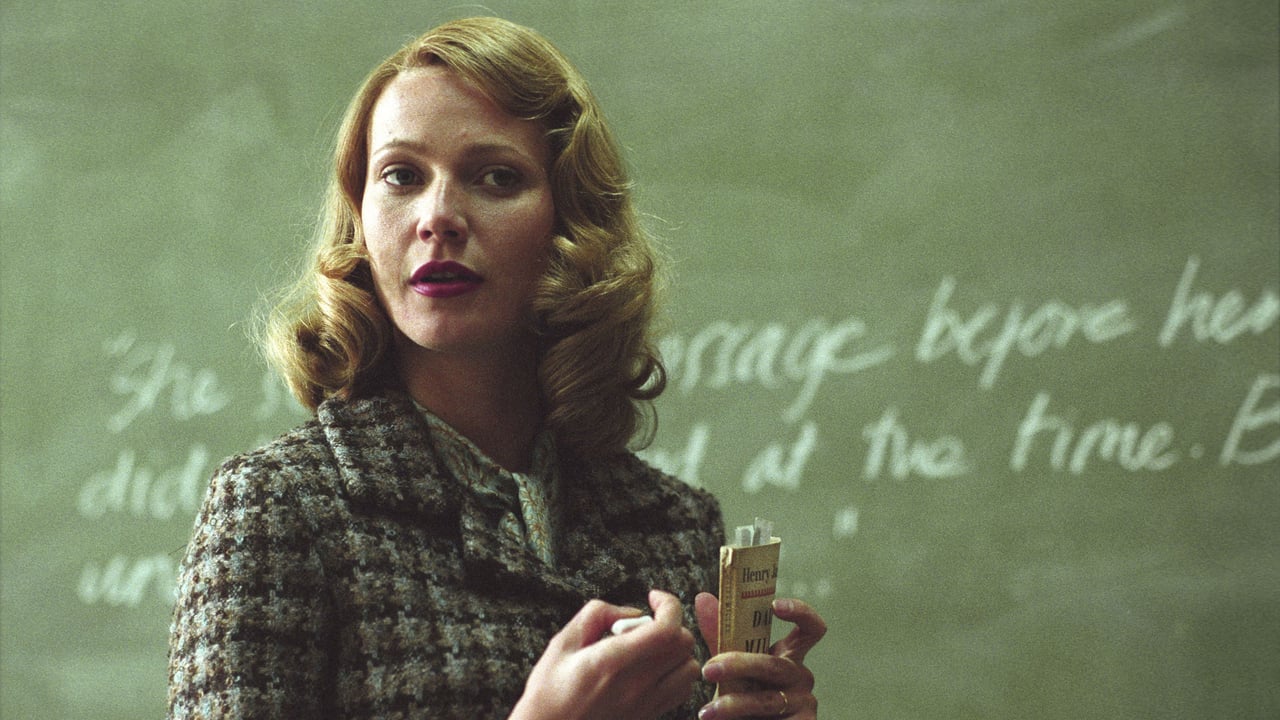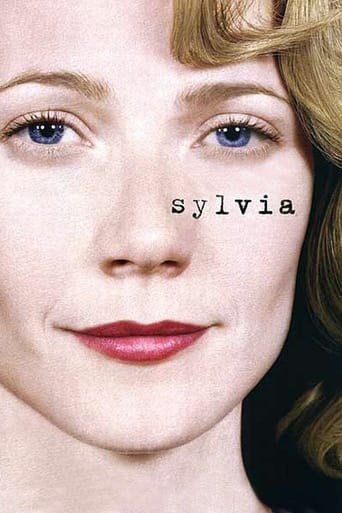Freaktana
A Major Disappointment
Gurlyndrobb
While it doesn't offer any answers, it both thrills and makes you think.
Quiet Muffin
This movie tries so hard to be funny, yet it falls flat every time. Just another example of recycled ideas repackaged with women in an attempt to appeal to a certain audience.
Fulke
Great example of an old-fashioned, pure-at-heart escapist event movie that doesn't pretend to be anything that it's not and has boat loads of fun being its own ludicrous self.
gemini_dremz
This biography of the relationship between poets Sylvia Plath and Ted Hughes is beautifully played out in this film. If anyone knows anything about either of them, they would certainly be able to see the uncanny reality of the actors portraying them. I thought Gwyneth Paltrow portrayed the depressed Plath in the truest form. I found the part of Ted Hughes, played superbly by Daniel Craig, rather fascinating. Being a ladies man, he was never faithful, not even to his lover, Assia Gutmann who also committed suicide by gas oven, taking the life of her four year old daughter in the process. Though we do not see Assia and Ted's relationship fall apart, we do see how it developed. The movie is entirely about the tumultuous relationship between Hughes and Plath and how her insecurities, which are made to appear psychotic, are actually true. Her sense of Ted's cheating comes to fruition and it kills her, literally. If you like biographical films, this one is a winner. On another note, the son of Sylvia and Ted also committed suicide March 3, 2009. It seems Mr. Hughes, had survived the tragedies surrounding him until his own death by cancer in 1998.
cinemaniac2002
It is no easy task to do a film about a writer, given that what occurs inside a writer's head is so intimate – and often misunderstood. Everything is open to interpretation – and each reader can tend to translate an author's words differently. Gwyneth Paltrow's portrayal of the author is compelling; she deftly neither over or under plays Plath. Daniel Craig as Ted Hughes displays a chemistry with Paltrow that is very believable. As a result of their renderings, the story has much more power and significance than it would if the actors were more obvious and dramatic in their portrayals.For all of its gloom and doom, "Sylvia" provides an introspective look into the life and world of a woman struggling to find her own identity – both as an individual and as a woman. Long before the cultural feminist awakening, Plath wrote astounding poetry that detailed the victimization, rebellion and resultant rage of so many women. As such, she essentially paved the way and gave "permission" for women to write in the most honest, raw and soulful way possible. It is important to know this before seeing the movie; otherwise, much of its true meaning may go lost.The story begins with Plath as an American studying at Cambridge. Her writing appears to be less than well received. However, this is to be expected during this particularly male dominated time. She meets the dashing poet, Ted Hughes, at a party she is attending after becoming aware that those responsible for her latest less than favorable review will be there. Ted insists that it was the editor who ripped her piece apart into shreds – but it is clear that Sylvia knows differently. Still, Plath recognized the brilliance of his work and winds up kissing him by the end of the evening, whereupon she bit his cheek, which drew blood. Thus began their passionate love affair. They move in 1956 to her Massachusetts hometown, where they marry and she sets about teaching at Smith. Four years later, upon struggling to write there, Ted insists that they go back to England. In a lonely country cottage, Sylvia develops the same writer's block problem, favoring baking over writing. Ted notices this, encouraging her to "find a subject" and write. Could be her life was too idyllic to find a subject; Ted would provide plenty of material in the future.They have two children. Plath struggles to separate herself from wife and motherhood in order to express something relevant. Sylvia confirms her suspicions that Ted is having an affair, whereupon they separate – but not before she burns some of his belongings. One could say that this behavior is outrageous – however, so is having an affair while married. However, as a student of psychoanalysis, Plath comes to the realization that she, in fact, had a hand in Ted's adultery; insisting that she "conjured" it – essentially willing it into existence. It is an interesting point that is rarely explored in this type of film. That Plath would take the entire blame for her husband's adultery suggests that at the base of suffering from depression and mental illness is a low level of self esteem and self worth, coupled with the inability to differentiate fantasy from reality. This could be why the heartbroken, 29 year old Sylvia embarked upon her extraordinary journey of self-expression, also perhaps prompting her to arrange for a brief coupling with her estranged husband. However, this last ditch attempt at reconciliation is dashed when Ted informs her that the woman he has been having an affair with is pregnant. While he could have decided to reunite with his wife, it is clear that he had no intention to do so. For the already emotionally fragile Plath, this had to be a major devastation.During her marital estrangement, Plath wrote some of her most compelling masterpieces. Unable to reconcile her life, Ted's betrayal and the end of her marriage, Plath gassed herself at 31 years old in the kitchen after setting out food and taping her children's door to protect them. After her death, her final collection, Ariel was published, as were the books Crossing the Water and Winter Trees in 1971. As is the case with many artists, her work became ever more notable, garnering the Pulitzer Prize in 1981 for a book of her Collected Poems.
tomsview
This is hardly what I would call an enjoyable movie. Based on the life of Sylvia Plath, it is well made, but emerges as a gloomy film with murky photography and a depressing story.The film starts as Sylvia, an American poet and writer, becomes involved with an intense and competitive group of poets at Cambridge University. Although Sylvia is struggling to be recognised as a poet, she falls in love with another rising poet and author, Ted Hughes. They marry and move to America where they secure teaching posts.Early in the movie, Sylvia's mother, referring to Sylvia, says to Ted, "I think you frighten her, that's why she likes you". Ted replies, "You think I would hurt her? No, I wouldn't hurt her". But according to this film, that's exactly what he does.Sylvia's career starts to take second place to her husband's as she is often left alone to raise their children. The film presents Ted as a philanderer who embraced life amongst his young, female students like the proverbial boy in the lolly-shop. Sylvia's suspicions about Ted's infidelity turn to paranoia and depression, although the film is at pains to show that her suspicions were never groundless. The marriage breaks down and the film ends as Sylvia takes her own life.There is a telling line in Terrence Rattigan's "The Browning Version" when the main character, Andrew Crocker-Harris, warns his wife's lover, "Never presume to know the secrets of a marriage". But in "Sylvia", the filmmakers presume to know just about every aspect of the relationship between Sylvia and Ted. Unfortunately, the film can't avoid a sense of superficiality with the way much of it plays out.With that said, Gwyneth Paltrow is blonde, beautiful and talented, and she was a good choice to play Sylvia Plath who was also blonde, beautiful and talented. In an interesting piece of casting, Gwyneth's mother, Blythe Danner, plays Sylvia's mother. Daniel Craig plays Ted Hughes, and he comes across as a very serious dude indeed. Another interesting aspect of the movie is how Dunedin in New Zealand doubled fairly convincingly for the British and American locations.This film was controversial, and it's easy to see why. These were real people and this film intrudes deeply into their lives. Having experienced suicide in my family, I would say that the last thing one would want is a spotlight played on the whole tragedy, decade after decade. There is always aftermath attached to anyone's passing but when suicide is involved, aftermath is a very inadequate word. For a spouse who has lost a partner in this way, guilt and recrimination last a lifetime, dulled only by time and distance. For a family to be constantly reminded of it through intense public scrutiny, and then have a rather one-eyed movie made about it is pretty tough stuff.
sexyhelene
The acting is not awful. Both Paltrow and Craig did quite a good job with their acting. The main problem of this film is that it did almost nothing to describe Plath's literary work or how her personal life affected her writing. The movie itself is basically a portrait of a failing marriage--the turbulent relationship between the couple and the husband's infidelity.One must understand that it is a challenge to make a biographical film on an artist (actor, writer, musician, or painter). This is because that not only is that artist being famous for his/her achievement in a special field, but also for his/her dramatic personal life. Here, the film focused heavily on Plath's unsuccessful marriage and a little on her poetry or her novel. Even the portrayal of the marriage is too one-sided. Obviously, Plath's loyal friends would have agreed with the film's depiction. Yet, Ted Hugh and his family might have some objections.I give this film 6/10. It is not a bad film. It is just not a film about a poet.

